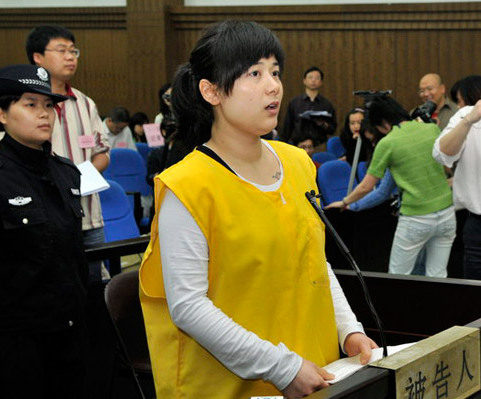Wu Ying and the case for financial reform
- By Ye Tan
 0 Comment(s)
0 Comment(s) Print
Print E-mail China.org.cn, April 28, 2012
E-mail China.org.cn, April 28, 2012
The Chinese Supreme People's Court overturned the death penalty of businesswoman Wu Ying on April 20 and sent her case back to the Zhejiang Provincial Court for retrial, highlighting the need for urgent government action to speed up comprehensive financial reforms to develop effective risk-control mechanisms for sparsely regulated private lending businesses.
|
|
|
Wu Ying, a 31-year-old businesswoman, stands trials at the Jinhua City Intermediate People's Court in East China's Zhejiang province, April 16, 2009 file photo. [Xinhua] |
Wu Ying, founder of Zhejiang-based Bense Group, was sentenced to death in late 2009 for the fraudulent fundraising of 770 million yuan (US$122 million). The case has sparked unprecedentedly hot debate in China and even drawn international attention.
The court's decision has been seen as a vital victory for reform advocates, despite the fact that there is currently no solid legal system regulating China's widespread private lending market. Doubtless the debates surrounding the case will continue, including why Wu's assets were auctioned off at a low price. There are also people who have not been convinced that Wu operated a Ponzi scheme.
The court's adjudication indicates that reform is the outcome of joint pushes.
Many doubt, however, that the decision to retry the case will lead decisively to bold financial reforms and the widespread belief that legal sanctity is inviolable.
To this end it is critical that the facts of the Wu case become clearly known in order that a sound legal mechanism is implemented to prevent any possible future miscarriages of justice. Wu hasn't been convicted of a crime serious enough to warrant facing the death penalty. She is basically a novice in the world of business: Ambitious, but lacking in risk control ability. It's also inaccurate to describe her as a hero who pioneered efforts to oppose existing financial monopolies.
In economic terms, the cost of enforcing regulations will be unimaginably high when such rules are violated by the majority. Under such circumstances, those who abide by the regulations will come face to face with the phenomenon of "bad money drives out good". A string of recent scandals, including toxic capsules and forced demolitions, shows that China still has work to do in order to ensure universal dignity for its people, most of whom are both the victims of rule breaches, and the abusers of rules. It's far-fetched to imagine that a single separate case such as Wu's can help people regain their dignity when dignity is generally disregarded.
The most important reason for the implementation of regulations and the restoration of people's dignity is to ensure that we oversee how those in power exercise their power. As long as Wu's case is examined within both market and legal frameworks we should support the process while monitoring it keenly. In this way, we can shed light on the dark world of the country's financial monopoly, local officials' illegal operations, involvement of the privileged class, and private financial principles. The overturning of Wu's death sentence is not the end of her case, so reformers should not relax and celebrate just yet.
Reformers should continue their efforts to improve laws rather than waiting for a hero to usher in change, as has happened in the past. China missed a number of opportunities to instigate constitutional reforms in the early 20th century, when violence and populism joined forces to create social turbulence. Different groups called on the masses, most of whom were illiterate, to take part in revolutions heralded by noble-sounding slogans. Since the end of the Qing Dynasty, assassination was considered a heroic deed, and various groups were diametrically opposed to each other, while the populace lacked confidence in the country's ability to ensure a bright future through reform.
Presently, China is at a critical stage in its reform process, and the education and literacy levels of the people are at their highest-ever levels. They are able to draw their own conclusions from the various information platforms available in today's information age, and then express their views on those same platforms.
Since the second financial reform was launched in the 1980s, the practice of striving for economic growth without focusing on reform has been largely discredited due to subsequent declining investment and exports and weakening domestic demand. In view of this, reform advocators called on the government to respond to people's appeals for reform, take effective measures to explore the specific approaches to carrying out reform, and deepen reform at all levels.
Each individual case could be a bridge leading to a constitutional society. As Wu may not face the death penalty after all, there is no reason for Chinese reform advocates to stop striving to improve financial reforms so that we may see fewer cases like Wu's in future.
The financial reform currently being carried out in Wenzhou City, Zhejiang Province is a genuine breakthrough in this respect. It is crucial that we resolve issues related to the marketization of interest rates, small and micro financial businesses and even institutions. The key to successfully resolving Wu's case, as well as similar future cases, lies in establishing a market mechanism with an effective property right protection system as well as a sound financial risk control mechanism.
The author is a financial commentator.
(This post was originally published in Chinese and translated by Zhang Junmian.)
Opinion articles reflect the views of their authors, not necessarily those of China.org.cn.







Go to Forum >>0 Comment(s)